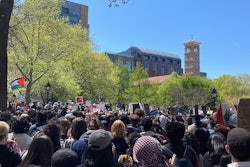The Biden Administration has won praise for its application for student loan forgiveness. The form for up to $20,000 of debt relief is fast and simple, and almost 26 million people have already applied. But the rollout has almost entirely excluded one of the groups of people most in need of debt forgiveness—the incarcerated.
The federal government does not keep statistics on how many student borrowers are in jails and prisons, but experts estimate that the number is as high as 250,000. These incarcerated borrowers face major difficulties paying their loans. While deferment, forbearance, and income-based repayment options exist, they require navigating bureaucracies and paperwork, for which people who are preparing for prison may have little time or wherewithal. Once inside, the incarcerated typically earn far below minimum wage, if anything, and often have little means of making their payments.
“Almost every borrower who's incarcerated that we've come across has been in default,” said Amber Saddler, counsel for Student Borrower Protection  Amber Saddler, counsel for Student Borrower Protection Center
Amber Saddler, counsel for Student Borrower Protection Center
“It makes it more difficult to find employment. It can make it more difficult to find housing. And these are things we know that incarcerated people struggle with anyway,” said Saddler.
“When people come home and that debt is still waiting for them, it impedes their ability to do what we want them to do, which is become productive citizens,” said Stacy Burnett, manager of the JSTOR Access in Prisons Initiative. “It’s a huge social problem if you’re locking them out of this relief.”
But locked out is just how many incarcerated Americans are finding themselves when it comes to accessing the application for debt relief. This is partially because of one of the very factors that has made it so easy for people on the outside—it's online.
“Incarcerated people don’t have access to the internet at large,” said Burnett.




















